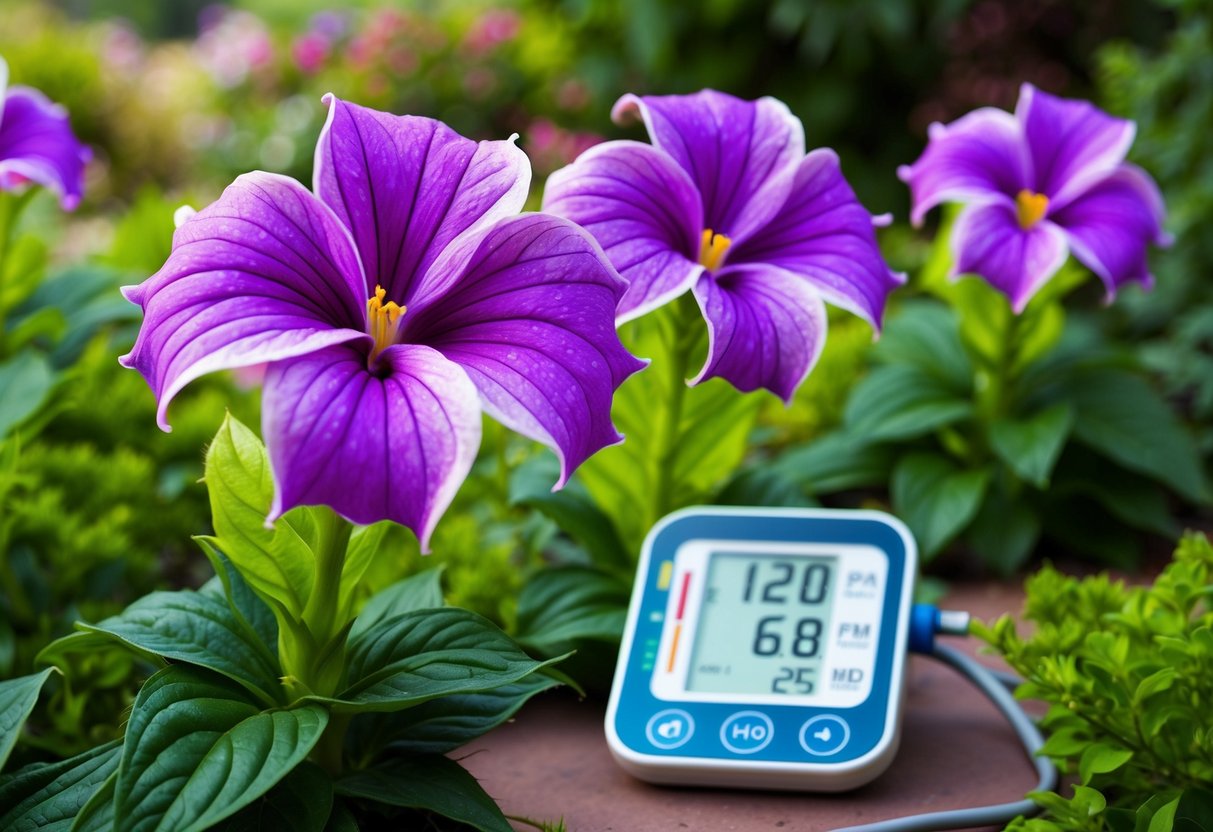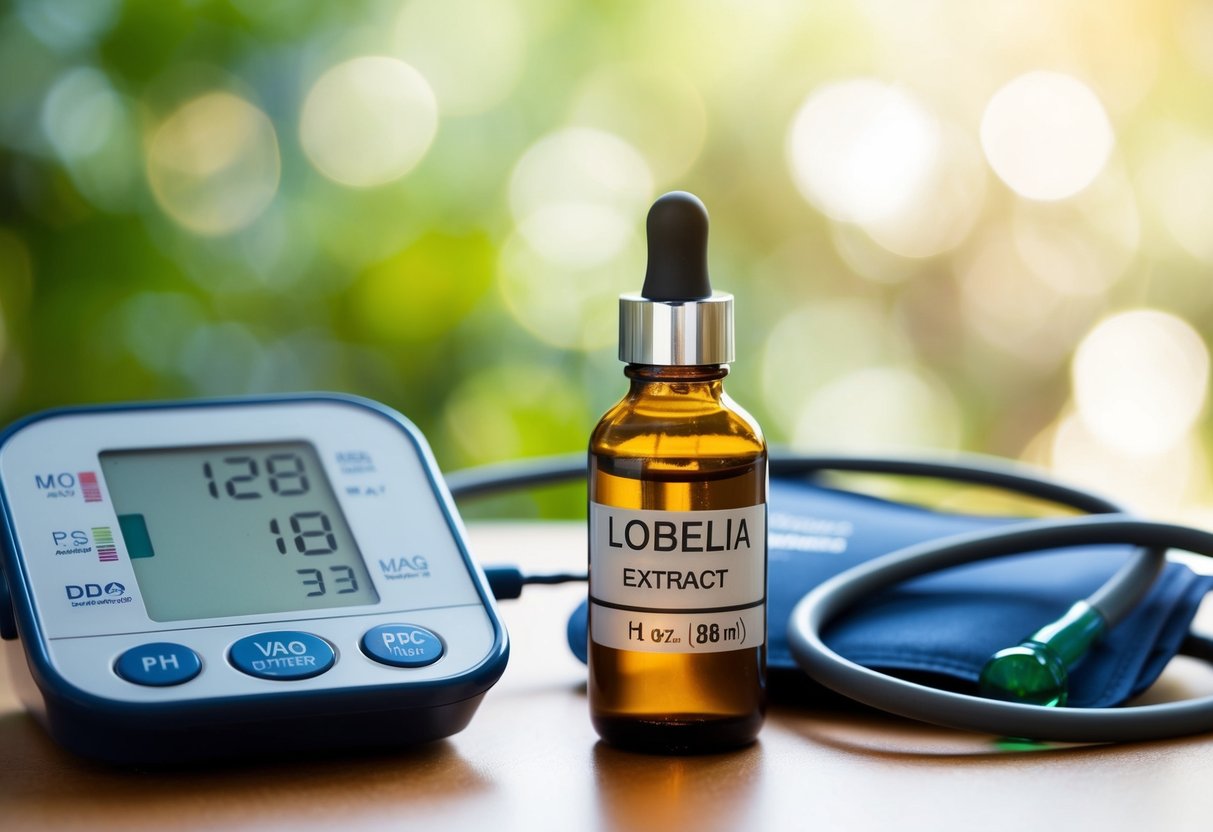Does Lobelia Raise Blood Pressure? Understanding Its Effects
Lobelia, a flowering herb, has been used for centuries for various medicinal purposes. It’s known for its potential benefits for respiratory issues and other health conditions. But if you’re concerned about your blood pressure, you might be curious about its effects in that area. Lobelia is known to potentially cause an increase in blood pressure, so it’s important to be cautious if you are considering using this herb.

While lobelia has its uses in traditional medicine, its side effects can be quite concerning. Some people experience nausea, vomiting, and even an increase in heart rate after consuming it. If you have high blood pressure or heart problems, it’s crucial to consult a healthcare provider before adding lobelia to your routine.
The history of lobelia’s use is intriguing, and there’s much to explore about this herb. Whether you’re considering it for its medicinal properties or looking to learn more about its potential impact on blood pressure, it’s important to have accurate information and expert advice.
What Is Lobelia?

Lobelia, sometimes called Indian tobacco, is a plant with a long history of use in herbal medicine. Known for its potential benefits and side effects, lobelia is especially relevant in respiratory health and traditional remedies.
Lobelia Inflata Overview
Lobelia inflata is the most well-known species of the lobelia plant. You might recognize it by its small blue flowers. The plant is native to North America and has been used for various medicinal purposes. It contains several active compounds, including lobeline. This compound is sometimes researched for its effects on the respiratory system and other health areas.
Due to its powerful properties, lobelia inflata should be used carefully. High doses can be toxic, causing symptoms like nausea, rapid heart rate, or dizziness.
Traditional Uses of Lobelia
Traditionally, native tribes in America used lobelia in several ways. It was often used as a remedy to relieve breathing problems like asthma and bronchitis. Lobelia’s use was also mentioned in herbal medicine for its potential to aid in quitting smoking, as it might mimic some properties of nicotine.
The versatility of lobelia made it a common component in traditional medicinal practices. However, it is crucial to approach it with care, especially if you consider using it alongside modern medicine.
Lobelia as an Herbal Remedy
Today, lobelia is popular in herbal remedies, especially for respiratory issues. It acts as a natural expectorant, helping to clear mucus from the airways. This can provide relief for asthma sufferers or those with chronic bronchitis.
Lobelia might also be found in tinctures, capsules, or teas. Herbalists sometimes recommend it for its anti-spasmodic properties, which help ease muscle tension and spasms. Despite its benefits, using lobelia safely requires caution, since it can cause significant side effects if not taken properly.
Always consult a healthcare provider before using lobelia as a remedy.
Lobelia’s Active Compounds

Lobelia contains several active compounds that are believed to impact your body, mainly focusing on its alkaloids. The standout among these compounds is lobeline, which has various effects on the nervous system.
Alkaloids and Their Effects
Lobelia is rich in alkaloids, which are natural compounds found in plants. These alkaloids have diverse effects on your body. In lobelia, alkaloids can act as stimulants, impacting your nervous system. They especially influence neurotransmitters such as dopamine, which can lead to changes in how your body responds to stimulation.
These effects have led to lobelia being used in traditional medicine for respiratory disorders and other health concerns. However, it’s important to note that high doses can be harmful, causing symptoms like nausea or even more severe reactions. That’s why you should always be cautious when using herbal remedies containing alkaloids.
Lobeline and Its Pharmacological Properties
Lobeline is the primary alkaloid in lobelia that captures most people’s attention. It interacts with dopamine receptors in your brain, which can help with respiratory issues by increasing respiratory drive. This property made it popular in early medicine for conditions like asthma.
Lobeline has also been studied for its potential in aiding smoking cessation by mimicking nicotine’s effects in the brain, which might reduce cravings. Despite these benefits, using lobeline without proper guidance isn’t recommended due to possible side effects like fast heartbeat or low blood pressure. Always consult a healthcare professional before using supplements containing lobeline.
Potential Health Benefits

Lobelia is an herb that can potentially provide various health benefits. It’s been explored for its role in helping with smoking cessation, easing respiratory ailments, and supporting digestive health.
Lobelia in Smoking Cessation
If you’re trying to quit smoking, lobelia may offer some help. The herb contains lobeline, which is thought to act similarly to nicotine by stimulating the release of dopamine, providing a calming effect. This might help reduce cravings and withdrawal symptoms. While you might find several treatments for smoking cessation, lobelia has been traditionally used and studied for its potential benefits. Please note that its use should be approached cautiously, as incorrect dosages can cause side effects.
Respiratory Ailments and Lobelia
Lobelia has been used to manage respiratory conditions like asthma, bronchitis, and cough. It may help clear mucus from your lungs, acting as an expectorant. The anti-inflammatory properties found in lobelia can ease the symptoms of asthma, reducing inflammation in the airways. It’s important to consult with a healthcare professional before using lobelia for respiratory ailments, especially due to its potent effects and possible interactions with other medications.
Lobelia for Digestive Health
Lobelia might also play a role in supporting your digestive health. It’s believed to stimulate digestion and may help with issues like nausea or stomach cramps. You can find it in various herbal supplements aimed at easing digestive discomfort. However, keep in mind that high doses of lobelia can lead to adverse effects like vomiting or diarrhea, so always use it under guidance. Remember to balance its potential benefit with its safety, especially if considering it for long-term use.
Safety Profile of Lobelia

Lobelia, a plant often used in traditional medicine, might have some benefits, but it also comes with certain risks. Understanding how it can affect your health is important before using it. This section will cover the side effects and situations where caution is needed.
Side Effects and Risks
Using lobelia might lead to a variety of side effects. Commonly reported symptoms include nausea, vomiting, and diarrhea. Some people may also experience mouth numbness or a bitter aftertaste.
In severe cases, lobelia can cause more serious effects, such as heart arrhythmia, dizziness, or tremors. Even larger doses could lead to sweating, fast heartbeat, and very low blood pressure. These effects may progress to coma, so it’s crucial to be cautious with dosing.
Contraindications and Precautions
Lobelia should be used carefully, especially if you have pre-existing health conditions. If you have heart disease or problems with blood pressure, you should avoid using it without consulting a healthcare professional.
The safety of lobelia during pregnancy is unclear, so it’s best to steer clear if you’re expecting or nursing. Because of its potential to affect respiration and heart rate, anyone with respiratory or cardiovascular issues should exercise caution. Always talk to your doctor before starting any new herbal remedies.
Usage and Dosage Considerations

When using lobelia, it’s important to understand how to consume it safely and effectively. This involves knowing the different forms it comes in, the suggested dosages, and how to integrate it into a healthy lifestyle.
Forms of Lobelia Consumption
Lobelia is available in multiple forms, each suited to different needs. Tea is a popular choice, offering a mild way to enjoy the herb’s properties. Extracts are more concentrated, often used when seeking specific benefits. A tincture is a liquid form, typically made by soaking lobelia in alcohol or vinegar. This is useful for precise dosing and quick absorption. Each form has its unique benefits, so consider what aligns best with your health goals.
Recommended Dosages
Dosages for lobelia can vary based on the form and purpose of use. For example, a common dosage for lobelia extract ranges from 5 to 10 drops up to three times daily. It is vital to avoid high doses, as large amounts can cause serious toxic effects like nausea, faster heartbeats, and low blood pressure. Always consult a healthcare professional to determine the right dosage for your needs, especially if using for smoking cessation or respiratory issues. Begin with small amounts and monitor your body’s response.
Creating a Balanced Health Approach
You should incorporate lobelia into your health routine mindfully, with a focus on balance. Pairing it with a diet rich in fruits, vegetables, whole grains, and healthy fats supports overall well-being. Limit red meat and opt for lean proteins when possible to complement the herb’s benefits. A balanced diet enhances lobelia’s effects and ensures your body receives essential nutrients.
Exercise regularly and stay hydrated to maximize the supportive roles of lobelia in your health journey. Always listen to your body’s signals and make adjustments as necessary.







